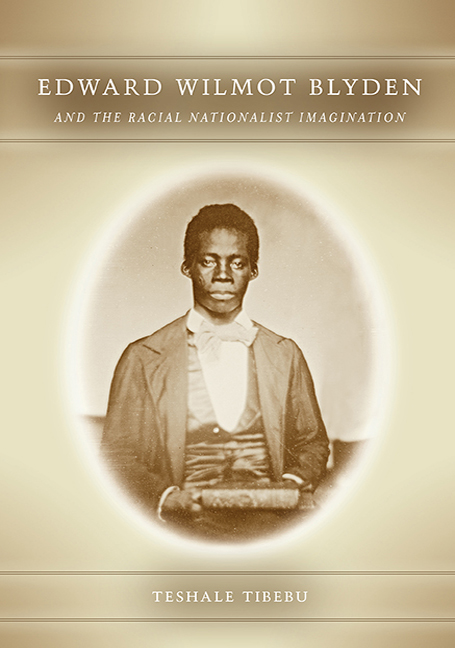Book contents
- Frontmatter
- Dedication
- Contents
- Acknowledgments
- Introduction
- 1 Africa: Service, Suffering, and Subjection
- 2 The Critique of Eurocentrism
- 3 Ishmael in Africa: Black Protestant Islamophilia
- 4 The African American “Civilizing Mission”
- 5 The “Mulatto” Nemesis
- 6 Appraising the Colonial Enterprise
- Epilogue: Post-Blydenian Reflections
- Notes
- Bibliography
- Index
5 - The “Mulatto” Nemesis
Published online by Cambridge University Press: 08 April 2017
- Frontmatter
- Dedication
- Contents
- Acknowledgments
- Introduction
- 1 Africa: Service, Suffering, and Subjection
- 2 The Critique of Eurocentrism
- 3 Ishmael in Africa: Black Protestant Islamophilia
- 4 The African American “Civilizing Mission”
- 5 The “Mulatto” Nemesis
- 6 Appraising the Colonial Enterprise
- Epilogue: Post-Blydenian Reflections
- Notes
- Bibliography
- Index
Summary
The law of God for each race is written on the tablets of their hearts, and no theories will ever obliterate the deep impression, or neutralise its influence upon their action; and in the process of their growth they will find or force a way for themselves.
—Blyden, Christianity, Islam, and the Negro RaceBlyden sees race as a concrete, material reality determined by the natural conditions of the human existence. Racism, on the other hand, is for him a sociohistorical construct. He writes in Christianity, Islam, and the Negro Race, “Hereditary qualities are fundamental, not to be created or replaced by human agencies, but to be assisted and improved. Nature determines the kind of tree, environments determine the quality and quantity of the fruit.” He accepts the racial distinctions of his time as matter of fact. Although he sees racial classification as natural, he objects to the racist hierarchical gradation. His is a case of nonhierarchical racialism.
Blyden continues, “The Negro of the ordinary traveler or missionary—and perhaps of two-thirds of the Christian world—is a purely fictitious being, constructed out of the traditions of slave-traders and slave-holders, who have circulated all sorts of absurd stories, and also out of prejudices inherited from ancestors, who were taught to regard the Negro as a legitimate object of traffic.” He calls history as his witness. There “is not a single mental or moral deficiency now existing among Africans … to which we cannot find a parallel in the past history of Europe, and even after the people had been brought under the influence of a nominal Christianity” (68–69). In these citations, Blyden alludes to the idea of the racist social construction of the “Negro.”
Comparing and contrasting Europeans with Africans, Blyden writes, “But to our mind it is not a question between the two races of inferiority or superiority. There is no absolute or essential superiority on the one side, no absolute or essential inferiority on the other side. It is a question of difference of endowment and difference of destiny.” He goes on to declare,
No amount of training or culture will make the Negro a European; on the other hand, no lack of training or deficiency of culture will make the European a Negro.
- Type
- Chapter
- Information
- Edward Wilmot Blyden and the Racial Nationalist Imagination , pp. 108 - 125Publisher: Boydell & BrewerPrint publication year: 2012

